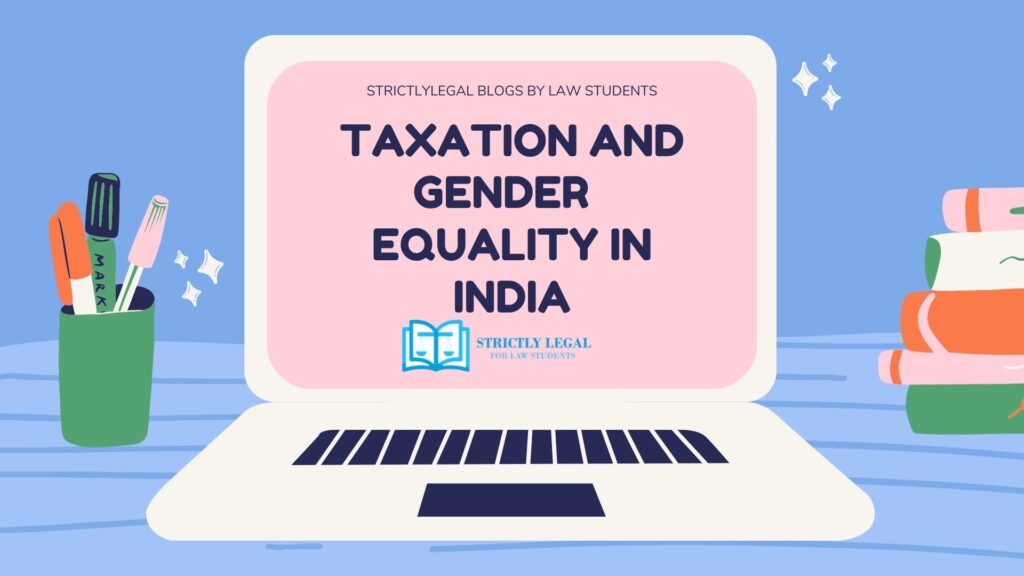The importance of gender quality and taxation, taken individually, has been widely recognized. However ,they have rarely been discussed together. It is necessary to acknowledge that , in order, to ensure sustainable economic growth , the consequences of one sector should not affect the other and vice versa. Although , not many people understand it , taxation and gender equality are related significantly.
This blog was submitted by Anishka Sharma, B.A.LL.B (Hons ) in Jaipur National University, Rajasthan
If we take in the concept of gender equality, women in developing and underdeveloped countries are more likely to live in poverty as compared to men. A fairer tax system is a direct way of tackling that inequality. Policies related to taxation should not negatively affect the outcomes in the area of gender equality.
Table of Contents
Types of gender bias
There are two kinds of gender biases – explicit and implicit. Explicit biases result from specific provisions of the law, regulations and proceedings that directly treat men and women differently. An example where explicit bias is prevalent is in the field of personal income tax. Implicit biases are more vague and are related to the differences in the way men and women are affected by the tax system.
Explicit gender bias mostly depends on the language used in the statute or the code and has a direct implication but in the case of implicit bias, it is corelated to social arrangements and thus its implications is more indirect and vague. Implicit bias is not easily identifiable as opposed to explicit bias because everyone’s idea of implicit bias is different and it varies from person to person and as such it cannot be generalized .
In India, there is no law that allows the joint filing of taxes. Filing of joint taxes has both pros and cons. One of the pros is that in the case when a spouse earns significantly more than the other , the higher earner might benefit from the combined taxes due to the lower tax bracket. However, one disadvantage of joint filing of taxes is that , women usually earn lesser than their spouses which invariably means that inspite of a lower tax bracket , its not necessary that she would have a say in how the beneficial amount is used.
Tax system often influences the distribution of capital and income. More often that not, higher taxes may lead to cutting up of services that would eventually lead to filing of higher taxes. Women are usually paid lower than their male counterparts for the same amount of work done. However, women tend to comply with tax law more than men. Also in one study , it was found that gender gap decreases, for example, when they increased the return on the public good. Similarly, the gap increased when they increased tax rates. The World Economic Forum estimates that it will take 202 years to close the gender pay gap.
Economic domains where gender inequalities have been identified.
There are many areas where women have unfairly faced the burden of economic discrimination and inequality. These include contribution of a woman’s income for household expenses. More often than not, it is the female in the house who is charged with groceries and other commodities. When there is a change in the price of these goods in response to changing tax policies, it can increase the burden on women to manage running the house with the same savings or income despite the increase in prices.
The time use survey shows that the average Indian woman spends 19.5 percent of her time everyday in unpaid work including household work and caregiving as compared to just 2.5 percent of the time spent by men. They also do over three times the amount of childcare as men.
Another area where women face gender equality is in regards with property and its ownership. In comparison to men, fewer women are owners of properties and they are seldom provided equal treatment as their male counterpart. Attempts to fleece them occurs frequently with people assuming their intellect has been lowered due to their gender. Buying of property is an investment in itself. It is a means to secure the future , and women’s ownership of immovable property, especially agricultural land can help her to achieve security and a positive economic and social status. The property that women own are usually charged higher tax. If the tax rate is reduced for the same, it may lead to more women owing property and eventually more security and better independency. It may considerably improve the social and financial status of women and is a step towards making them self-sufficient.
Relevancy of gender in taxation
- In countries other than India, taxes are filed jointly between spouses. This may lead to women paying higher marginal rate than if taxes were filed separately. It is believed that the foundation of the tax system is biased towards women. Women are charged higher taxes than men. And the taxes that are imposed on household items (which predominantly falls in the domain of the woman of the house) may discourage women to participate in contributing to the household. Similarly, there are products which are predominantly consumed by men for example cigarettes, hard drinks etc and taxes imposed on these items affect men more than women.
- Women are often paid less than men for the same amount of work done. Also, women do the majority of unpaid work like taking care of elderly and children, household chores. Women who are working are also expected to complete hose work in addition to their official work. This unarguably puts additional burden on them. Also, paying taxes on household items as well as on the income charged can further add on the burden on women.
- Administration is a key element in bringing positive changes in the society. However, in the field of tax administration, very few women hold key posts. Which invariably leads to less policies that could benefit women as most men cannot grasp the need to formulate policies keeping the female population in mind. Proper representation of women is necessary for bringing an impactful change that could empower, challenge and uplift women
Conclusion
The study on taxation and gender equality is not widespread and not many sources can be found on the same. However, its necessary to acknowledge that the two are intimately linked. Taxation plays a significant step in ensuring gender equality no matter how unrelated the two might seem. A fair and a progressive tax system allows women to participate and contribute towards the economic cycle thus benefiting the nation and providing a platform to women to improve their overall place in the society.
Like many sectors in the society, tax system also treats men and women differently. There have been a few countries for example Western European countries, France, Malaysia ,The Netherlands , South Africa and Ireland who have reformed their tax systems to reduce the discrimination it provided towards women and to make the tax system more unbiased. Income tax has an effect on how we spend the money, how much money needs to be saved and a huge impact on the lifestyle of a person. Hence , its necessary that the tax system should be unbiased to uplift women as well as the economic system. It is also a fact that women tend to get more stressed about tax related matters than men. They perceive the subject of taxation as a burden. It’s important for women to be aware of the taxation system so that they can deal with the challenges related to payment of taxes , interest rates etc. It should be ensured that there is gender equality in tax administration so that more women can come forward about tax related matters and it can also turn out to be a gold way to empower women by placing them in a position of power where they can actively take part in improving the conditions for female taxpayers.
This article may appear at other places on the web.

Users not registered with Strictlylegal can Email us their content and the same are posted through this account. In case of abuse, kindly let us know at Contact@https://strictlylegal.in




